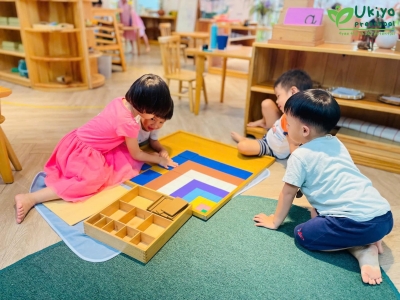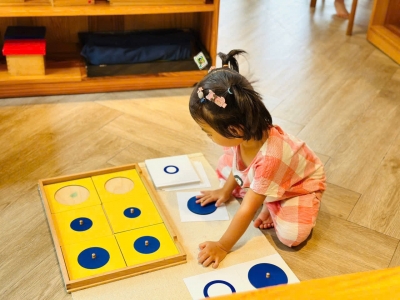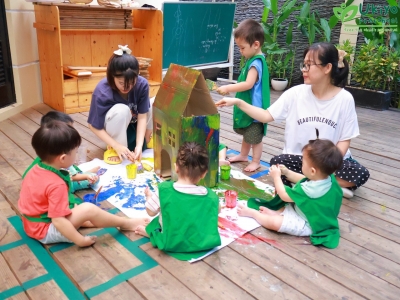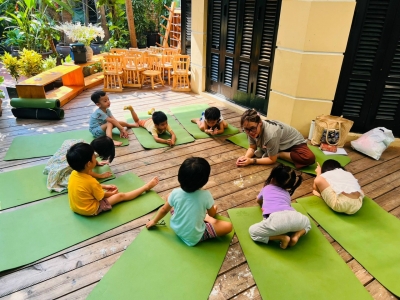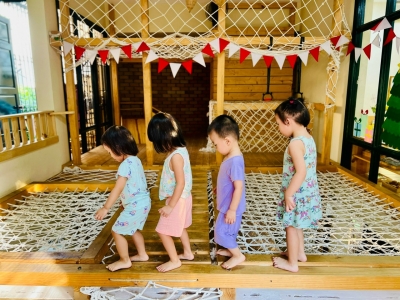FOREIGN LANGUAGE PROGRAM INTRODUCTION UKIYO
1. Overview
The Foreign Language Program at UKIYO is designed to help children develop language skills naturally and confidently. The program consists of two main parts:
- Montessori Academics
- Integrated English session in the afternoon
2. Montessori Academics
One of the five main activity areas in Montessori education, the Language area helps meet children's needs for communication, connection, social adaptation, and self-definition during their self-construction process.
2.1. Sensitive Period
During the sensitive period for language development (ages 3-6), children experience a "mind-absorbing" phase where their vocabulary rapidly expands from 1,000 to 5,000 words. They also refine their pronunciation and sentence structure. At this stage, children consciously access their vocabulary and learn new languages similarly to native speakers. Therefore, it is crucial to provide a multilingual environment for their development.
2.2. Program Objectives
The program aims to help children achieve bilingual proficiency in speaking, reading, and writing. It also fosters observational skills, fine motor skills, and a sense of wonder and appreciation for the arts.
2.3. Skill Development
2.3.1. Speaking
The program develops speaking skills in preparation for future reading and writing through activities and games such as:
- Sound games
- Response games
- News reporting
- Storytelling
- Reading stories
- Earth and water exploration
These activities help children:
- Build and enrich vocabulary
- Recognize speech sounds
- Explore vocabulary through sound
- Improve pronunciation and expression
- Develop an awareness of language structure
- Lay the foundation for future language development
2.3.2. Writing
The program offers a series of structured activities that promote fine motor skills, observation, perception, spatial orientation, and logical thinking. These activities include:
- Geometric metal insets
- Sandpaper letters
- Sand trays
- Loose letters
- Phonetic object boxes
- Blends
Through these activities, children can:
- Refine handwriting skills
- Master the use and control of writing tools
- Express their ideas clearly and logically
- Develop creative writing skills
The Montessori approach to writing contrasts with traditional methods. Children are not forced to write, but rather begin writing spontaneously after practicing various indirect and direct activities that prepare their hands and minds.
2.3.3. Reading
Learning to read differs from learning to write. Writing expresses an individual's thoughts, while reading is more complex, as it requires understanding the words expressed by others.
To read, children must go through two stages:
- Indirect preparation
- Direct preparation
Indirect Preparation
Everyday activities, language, sensory experiences, and speaking skills all contribute to children's reading development. For example, their eyes are refined to recognize characters. When working with sensory materials, children follow a specific pattern from left to right and top to bottom. This helps them develop spatial awareness.
Direct Preparation
The intellectual preparation for writing also directly prepares children for reading. For example, sound games, spoken grammar, question games, sandpaper letters, loose letters, and writing stages on sand trays, boards, and paper all help children recognize letters and sounds. They practice through games, associating sounds with letters to form meaningful and meaningless words. This is key to helping children learn to read and write simultaneously.
2.3.4. Stages of Reading Development
Reading ability develops after writing ability. When writing, children try to read what they write. When they see signs at supermarkets, street signs, or books and magazines, they try to sound out and read the words they can recognize. This is an indication that children are beginning to read. The program will support children by:
- Providing phonetic information through three senses (sight, touch, and hearing)
- Helping children recognize the function of vocabulary
- Preparing for analytical reading and the function of vocabulary
- Helping children recognize and analyze simple sentences
The advanced stage will prepare children for three skills:
- Mechanical reading
- Interpretive reading
- Reading comprehension
Ultimately, the program aims for comprehensive reading skills:
- Helping children recognize words and phrases in a sentence to better express what they read
- Preparing for better reading comprehension and self-expression through both spoken and creative written language
- Preparing to understand differences in writing style
- Helping children learn to express their ideas clearly and logically
Additionally, children are exposed to culture and art in the Language area through music activities such as the names of the notes of the C major scale, music notation, and practice exercises in visual arts. All of this prepares children for the goal of becoming "creative writers," which is the moment when they truly enjoy learning language.

Integrated English Session in the Afternoon
1. Program Overview
The Integrated English Session in the Afternoon is designed by TESOL-certified teachers to ensure integration with the Montessori program in the morning. It closely follows the monthly theme to provide a seamless learning experience for children throughout the day. The main contents include:
1.1. Review and Reinforcement:
In the afternoon, children reinforce and review concepts introduced in the morning through individual or small group activities. This stage helps solidify language acquisition and understanding, providing a multidimensional and holistic learning experience.
1.2. Social Interaction and Team Building:
In addition to language acquisition, afternoon classes also encourage social interaction and collaboration among children. Through collaborative activities, children develop essential social skills and learn to cooperate and communicate, building a solid foundation for meaningful relationships.
1.3. Language Integration:
English learning is integrated through activities such as hands-on experiments, interactive games, and physical activities. Children, who do not distinguish between learning and playing at this stage, will acquire English confidently and easily.
Benefits of Bilingualism:
A child who knows two or three languages will have cognitive flexibility, faster reaction and processing times, and better adaptability to different cultures. They will be more cheerful, outgoing, and confident in using language. As they grow older, they will also have greater success in their studies and careers.
Ukiyo's Philosophy:
Ukiyo believes that children's language abilities must be adequately expressed before the sensitive period ends for them to begin striving for the next stage of learning. We create a language environment for children to speak and express their thoughts. We help children be brave and confident in expressing themselves.
Program Objectives:
- To help children develop fluency and accuracy in speaking and using English
- To foster a love for learning English and other languages
- To build confidence in using English in various social contexts
- To prepare children for future academic and career success
Others



